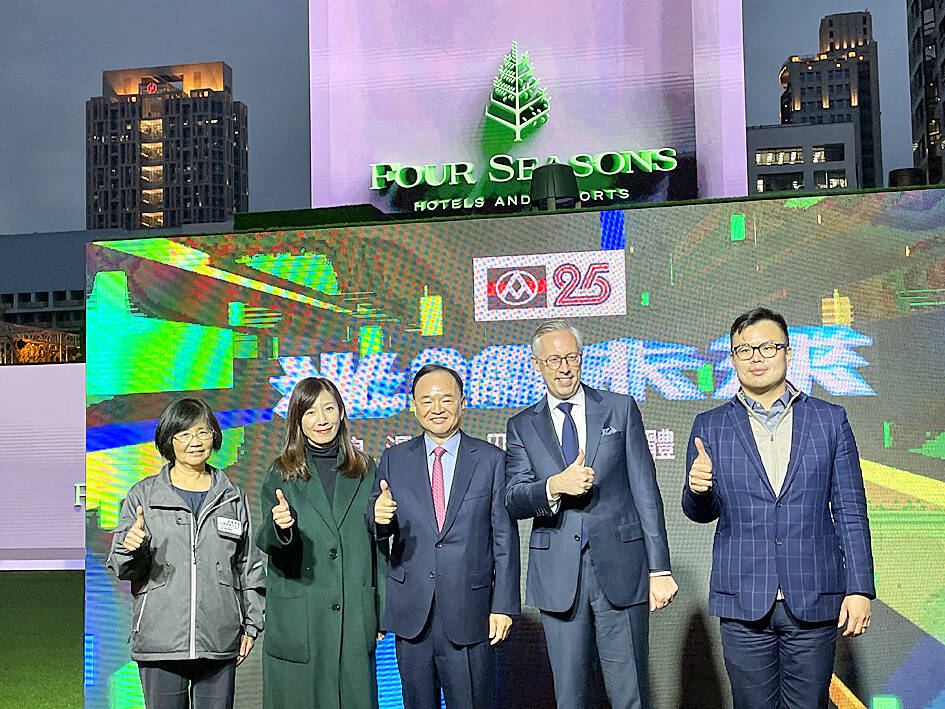International hospitality operator Four Seasons Hotels and Resorts is partnering with Taiwanese developer Yuanlih Group (元利建設) to open a new five-star hotel in central Taipei.
They announced the collaboration on Tuesday evening, saying that the Toronto-based company aims to boost its presence in Asia, while the local developer seeks to venture into the hotel business.
“Taipei has long been a target destination for Four Seasons, as we look to expand our presence in Asia’s most important cities,” Four Seasons global business development and portfolio management president Bart Carnahan said.

Photo: Amy Yang, Taipei Times
The new property, Four Seasons Hotel Taipei, would be in Xinyi District (信義), opposite Taipei 101, one of the city’s top tourist attractions, and home the Taiwan Stock Exchange, major banks and organizations, and high-end shopping and office spaces.
The location was chosen to ensure that the hotel would be convenient for business and leisure travelers alike, Carnahan said.
The hotel would be built on a 1,552 ping (5,121m2) plot and have about 260 rooms on 31 floors above ground, Yuanlih chairman Lin Ming-hsiung (林敏雄) said, adding that construction began last year and would finish in 2025.
Lin — who also heads PX Mart Co Ltd (全聯實業), the operator of PXmart (全聯福利中心), the nation’s largest supermarket chain — said he previously aimed to build an office building on the plot, but Four Seasons approached him and he changed his plan.
Lin said that despite his lack of experience in the hospitality industry, he is confident in the luxury hotel brand.
Four Seasons does not own any of its properties worldwide, but operates them on behalf of real-estate management firms and developers.
The contracts between Four Seasons and property owners typically permit it to participate in the design of the property and run it with nearly total control over every aspect of the operation.
Four Seasons Hotel Taipei would have a restaurant focused on Chinese cuisine, a destination bar, a specialty restaurant, an all-day restaurant, a pool bar and a lobby lounge, Carnahan said.
Lin said construction costs have picked up significantly in the past few years, but remain bearable.
The arrival of Four Seasons would sharpen competition in Xinyi District, where private equity fund Riant Capital Ltd (子樂投資) is to launch two luxury hotels under the Park Hyatt and Andaz brands in the yet-to-open Taipei Sky Tower.
The new hotels would have to compete with Grand Hyatt, W Hotel and Le Meridien.
Formosa International Hotels Corp (晶華集團) said it welcomed more internationally renowned hotel brands, saying they would help raise Taipei’s profile on the world stage.

NEW IDENTITY: Known for its software, India has expanded into hardware, with its semiconductor industry growing from US$38bn in 2023 to US$45bn to US$50bn India on Saturday inaugurated its first semiconductor assembly and test facility, a milestone in the government’s push to reduce dependence on foreign chipmakers and stake a claim in a sector dominated by China. Indian Prime Minister Narendra Modi opened US firm Micron Technology Inc’s semiconductor assembly, test and packaging unit in his home state of Gujarat, hailing the “dawn of a new era” for India’s technology ambitions. “When young Indians look back in the future, they will see this decade as the turning point in our tech future,” Modi told the event, which was broadcast on his YouTube channel. The plant would convert

‘SEISMIC SHIFT’: The researcher forecast there would be about 1.1 billion mobile shipments this year, down from 1.26 billion the prior year and erasing years of gains The global smartphone market is expected to contract 12.9 percent this year due to the unprecedented memorychip shortage, marking “a crisis like no other,” researcher International Data Corp (IDC) said. The new forecast, a dramatic revision down from earlier estimates, gives the latest accounting of the ongoing memory crunch that is affecting every corner of the electronics industry. The demand for advanced memory to power artificial intelligence (AI) tasks has drained global supply until well into next year and jeopardizes the business model of many smartphone makers. IDC forecast about 1.1 billion mobile shipments this year, down from 1.26 billion the prior

People stand in a Pokemon store in Tokyo on Thursday. One of the world highest-grossing franchises is celebrated its 30th anniversary yesterday.

Zimbabwe’s ban on raw lithium exports is forcing Chinese miners to rethink their strategy, speeding up plans to process the metal locally instead of shipping it to China’s vast rechargeable battery industry. The country is Africa’s largest lithium producer and has one of the world’s largest reserves, according to the US Geological Survey (USGS). Zimbabwe already banned the export of lithium ore in 2022 and last year announced it would halt exports of lithium concentrates from January next year. However, on Wednesday it imposed the ban with immediate effect, leaving unclear what the lithium mining sector would do in the